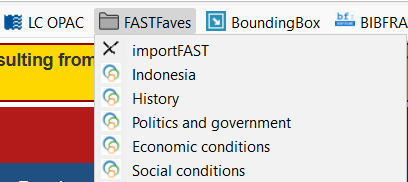Scope: This procedure guides catalogers on how to search and apply FAST headings to E/L=7 records. It also explains how to add non-authorized headings.
To Logon to FAST: http://fast.oclc.org/searchfast/
Source: FAST: Faceted application of subject terminology, principles and application by Lois Mai Chan and Edward T. O’Neill.
Contacts: Ardeen White
Unit: Cataloging
Date last reviewed: July 2023
Date of next review: June 2024
Types of Headings
Searching
Notes Concerning Application
FAST quick reference chart to some confusing headings
If You Need to Assign a Name Heading that is not in FAST
If You Need to Assign a Topical Subject Heading String that is not in FAST
If You Need to Assign a Geographical Name that is not in FAST
Creating and using a "Favorites" button in browser for frequently used FAST terms
Types of headings - all are repeatable:
600:: Personal name
610:: Corporate name
611:: Event name
630:: Uniform/Preferred title
648:: Chronological term
650:: Topical term
651:: Geographic name
655:: Form/Genre
650 | _7 |a Minorities |x Economic conditions |2 fast |0 (OCoLC)fst01023115 |
Searching:
●# substitutes for a single character
●? substitutes for multiple characters
●* is used for truncation
Click on ‘Heading,’ ‘Facet’, ‘Uses’ to sort. Sorting on ‘Heading’ is most useful to see the heading and related sub-headings. Clicking on the specific headings brings up the authority record.
Notes Concerning Application:
650:: Topical term
651:: Geographic term
600:: Personal name
610:: Corporate name
Ex. Virginia Agricultural and Mechanical College [first name]
Virginia Polytechnic Institute and State University [current name]
The first name would cover the founding of the College.
The current name would cover anything about the University.
611:: Event
648:: Chronological term
Ex. of book about Grant’s Vicksburg campaign:
Geographic headings: Mississippi
Chronological headings: 1862-1863
Event heading: American Civil War (1861-1865)
Ex. 648: 7: 1939-1975 |2 fast
655:: Genre/form
630:: Uniform/preferred title
FAST quick reference chart to some confusing headings:
LCSH | Old FAST | Current FAST (Use "Keywords" search except where noted) |
Congresses | Conference proceedings | Conference papers and proceedings (655) |
Description and travel | Travel | |
Economic conditions | Economic history | Economic conditions (Use "Full heading" search) |
Foreign economic relations | International economic relations | |
Politics and government | Political science | Politics and government (Use "Full heading" search) |
Relations –or- Foreign relations | International relations –or- Diplomatic relations | |
Social conditions | Social history | Social conditions (Use "Full heading" search) |
If you need to assign a subject heading (personal or corporate name) that is not in FAST but is in NAF:
Create a personal or corporate name by using "Import to FAST Subject Headings" at fast.oclc.org/import/fast (Tip: add this as a FAST Faves bookmark)
Select a name facet to import and follow the steps. Note: You will need to copy the LCCN from the LC name authority to search for and create the heading.
If you need to assign a subject heading (topical string) that is allowed under LCSH as a main heading/subdivision combination:
Create a topical string by using "Import to FAST Subject Headings" at fast.oclc.org/importfast
Select the topical facet to import and follow the steps.
If you need to assign a name heading that is not in FAST and not in NAF: (this is done manually, not with the Import tool)
Choose a matching heading from the Voyager headings list, or if there is no match, formulate a new heading according to RDA that is unique within Voyager. Add it to the record with a $2 fast/NIC as follows:
600 17 $a Kovari, Jason $2 fast/NIC
610 27 $a Amit Bhatia Libe Café $2 fast/NIC
If you need to assign a geographical 651 that is not in FAST but is in NAF: (this is done manually, not with the Import tool)
Ex. Limbang (Sarawak, Malaysia), lccn nb2011029279
Use: 651 : 7: $a Malaysia $z Limbang (Sarawak) $2 fast/naf $0 (DLC) nb2011029279
Creating and using a "Favorites" button in browser for frequently used FAST terms:
In your Internet browser, add a Folder to your bookmarks toolbar called “FASTFaves”. Bookmark FAST searches you want to save, and rename them to something useful. Save these to the FASTFaves folder you just created. These terms are then readily available from the pull-down menu in your toolbar folder.
